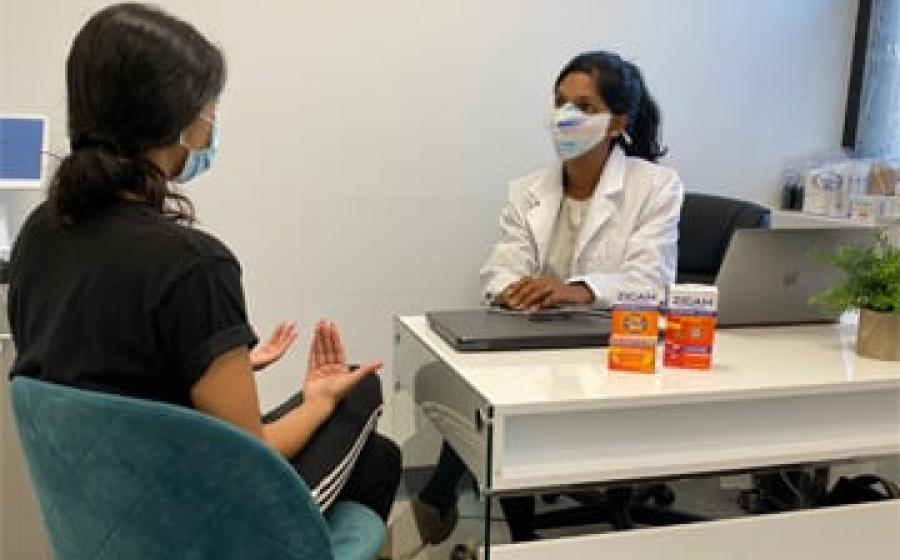Don't Ignore Irregular Heartbeat
(NewsUSA) -Atrial fibrillation (also called AFib or AF) is a quivering or irregular heartbeat that can lead to blood clots, stroke, heart failure and other heart-related complications.
-Atrial fibrillation (also called AFib or AF) is a quivering or irregular heartbeat that can lead to blood clots, stroke, heart failure and other heart-related complications.
In fact, having AFib makes you up to five times more likely to have a stroke, according to the American Stroke Association, a division of the American Heart Association, a global force for healthier lives for all.
Most strokes caused by AFib could be prevented with effective treatment, but only about half of AFib patients receive proper therapy.
Approximately 5.2 million people in the United States experience AFib, and that number is expected to more than double in the next ten years, according to the American Heart Association.
Although anyone can develop AFib at any age, the risk is greatest for individuals older than 50 years, those with a family history of AFib, smokers and those with high blood pressure or other forms of heart disease.
Although AFib is less prevalent in Black and Latino individuals compared with white individuals, Black and Latino people living with AFib have a higher risk of AFib-related death when they also have conditions such as high blood pressure and heart failure, according to the American Stroke Association.
The best-known symptom of AFib is a fluttering heartbeat, but not all individuals with AFib experience this, and many people with AFib report no symptoms prior to diagnosis.
"Because of this, it's important that people at risk for AFib continuously speak to their doctors about any unusual sensations involving their heartbeat," says Mark Estes, M.D., FACC, FHRS, American Heart Association volunteer medical expert and professor of Medicine and Program Director of the Clinical Cardiac Electrophysiology Fellowship at the University of Pittsburgh School of Medicine.
Other symptoms of AFib include shortness of breath, fatigue, dizziness, faintness, sweating and chest pressure.
Up to 84% of strokes caused by AFib are preventable if patients receive early, effective treatment. That means it is important to talk to your doctor if you are at increased risk for AFib. The American Stroke Association offers a downloadable symptom tracker that can serve as an important tool for conversations with your doctor about how to stay healthy.
To learn ways to manage AFib, the American Stroke Association has created an online portal, MyAFibExperience.org, where individuals with AFib can share their stories and learn from the experiences of others.



 - Selecting the Medicare plan best suited for your individual health needs is important for all eligible beneficiaries to consider at this time of year as the Medicare Advantage and Prescription Drug Plan Annual Election Period (AEP) runs from October 15 through December 7.
- Selecting the Medicare plan best suited for your individual health needs is important for all eligible beneficiaries to consider at this time of year as the Medicare Advantage and Prescription Drug Plan Annual Election Period (AEP) runs from October 15 through December 7.
 -If you witness someone having a cardiac arrest, don't be afraid to act, especially since that person may be someone you know in a familiar setting.
-If you witness someone having a cardiac arrest, don't be afraid to act, especially since that person may be someone you know in a familiar setting.
 - The past year-and-a-half has brought unprecedented levels of stress to everyone, but parents in particular shouldered an extra load, as children's schedules (and emotions) were turned upside down. In fact, Gallup's 2021 Emotions Report shows that women with young children at home were hit the hardest in terms of pandemic stress and worry.
- The past year-and-a-half has brought unprecedented levels of stress to everyone, but parents in particular shouldered an extra load, as children's schedules (and emotions) were turned upside down. In fact, Gallup's 2021 Emotions Report shows that women with young children at home were hit the hardest in terms of pandemic stress and worry.
 - The end of summer and beginning of fall is an exciting time for all. With pumpkin picking, hayrides, and spooky festivities to look forward to, it is crucial that everyone is prepared to tackle the onset of cold and flu season so that those crisp-air activities can be fully enjoyed. Dr. Shirin Peters, a NYC internist at
- The end of summer and beginning of fall is an exciting time for all. With pumpkin picking, hayrides, and spooky festivities to look forward to, it is crucial that everyone is prepared to tackle the onset of cold and flu season so that those crisp-air activities can be fully enjoyed. Dr. Shirin Peters, a NYC internist at 
 - People suffer from oral pain for a variety of reasons -- a cavity that needs to be filled, sensitive gums, canker sores, dry socket or, most commonly, a nagging toothache.
- People suffer from oral pain for a variety of reasons -- a cavity that needs to be filled, sensitive gums, canker sores, dry socket or, most commonly, a nagging toothache.
 - The arrival of the COVID-19 pandemic has forced people to live most of their lives, including work, entertainment, and personal interactions, online. All this screen time has taken a toll, as more people of all ages are reporting symptoms of "cybersickness."
- The arrival of the COVID-19 pandemic has forced people to live most of their lives, including work, entertainment, and personal interactions, online. All this screen time has taken a toll, as more people of all ages are reporting symptoms of "cybersickness."
 - Cooling towers, a key component on large buildings, require special levels of cleaning to control biocontaminants including Legionella, heterotrophic bacteria, and others. However, poorly maintained towers, which are often treated with corrosive chemicals, can become 'super spreaders' of Legionnaires' Disease, an acute bacterial infection of the lower respiratory tract that is not rare and causes severe pneumonia.
- Cooling towers, a key component on large buildings, require special levels of cleaning to control biocontaminants including Legionella, heterotrophic bacteria, and others. However, poorly maintained towers, which are often treated with corrosive chemicals, can become 'super spreaders' of Legionnaires' Disease, an acute bacterial infection of the lower respiratory tract that is not rare and causes severe pneumonia.
 -As we head into fall and go back to school, it's more important than ever to carry on with healthy hydration habits from the long, hot days of summer. The human body is made up of 50% water. In order to achieve peak hydration needs, kids ages 4-8 require five cups of water per day and kids ages 8+ require 7-8 cups per day.
-As we head into fall and go back to school, it's more important than ever to carry on with healthy hydration habits from the long, hot days of summer. The human body is made up of 50% water. In order to achieve peak hydration needs, kids ages 4-8 require five cups of water per day and kids ages 8+ require 7-8 cups per day.
 - The past year-and-a-half has brought unprecedented levels of stress to everyone, but parents in particular shouldered an extra load, as children's schedules (and emotions) were turned upside down. In fact, Gallup's 2021 Emotions Report shows that women with young children at home were hit the hardest in terms of pandemic stress and worry.
- The past year-and-a-half has brought unprecedented levels of stress to everyone, but parents in particular shouldered an extra load, as children's schedules (and emotions) were turned upside down. In fact, Gallup's 2021 Emotions Report shows that women with young children at home were hit the hardest in terms of pandemic stress and worry.

